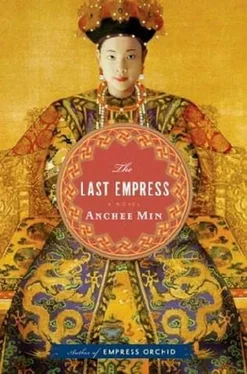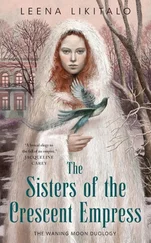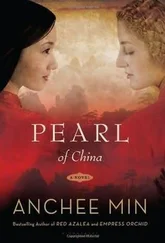"I haven't the facts yet."
"Tell me whatever you know."
The eunuch insisted that he be allowed to remain silent until he obtained more information. Without wasting a moment, he left.
All night long I thought about my son. I wondered whether it was Prince Kung who was manipulating Tung Chih in order to get back at me. The word was that after Kung apologized for his behavior, he ended his friendship with Yung Lu. They had split over the case of General Sheng Pao.
I knew Tung Chih was still bewildered and angry over my treatment of his uncle. Prince Kung was the closest thing to a father he had, and he resented that he had been the one to read the condemning edict before his uncle and the entire court. He might have only barely grasped the import of the words he read, but he could not have missed the look of humiliation in his uncle's eyes as they turned away from him. I knew my son blamed me for this and so much else.
Tung Chih was spending more and more time with Kung's son, Tsai-chen. I rejoiced that together they could escape from the pressures of the court in each other's company, however briefly. In my mind I joined them on their rides through the palace gardens and in the royal parks beyond. My spirits lifted when they returned, their faces flushed with color. I sensed a greater independence in my son. But I had begun to wonder whether it was true independence or simply his avoidance of me, his mother, whom he associated with the tiresome attendance at audiences, the person who told him to do things he didn't wish to do.
I didn't know how to quell his anger except to leave him alone and hope that it would pass. Increasingly we saw each other only at audiences, which just deepened my loneliness and made my nights longer. More and more my thoughts returned to the old concubines and widows of the Palace Temple, to wonder if their fate was not more tolerable than my own.
In order to protect me, Yung Lu had removed himself to a distant corner of the empire. I had been the subject of scorn and misunderstanding since the day I gave birth to Tung Chih, so I was used to it. I didn't expect the rumors and nightmares to stop until Tung Chih had gone through the ceremony of officially mounting the throne.
My only true wish was to establish a life of my own, a possibility I feared was slipping away. For the sake of my son's future, I could not remove myself from my duties as a regent. But to stay was to be embroiled in conflicts whose resolutions I could not grasp. I wondered what life was like for Yung Lu on the frontier. I had willed myself to stop fantasizing about us as lovers, but my senses continued to betray me. His absence made the audiences unbearable.
Knowing that I would never be in Yung Lu's arms, I was envious of those whose lips pronounced his name. He was the nation's most desirable bachelor, and his every move was observed. I imagined his doorsill being worn down by matchmakers.
To avoid frustration I kept busy and cultivated friendships. I reached out to support General Tseng Kuo-fan in his strategy to thwart the Taiping peasant rebels. In my son's name I congratulated his every victory.
Yesterday I'd granted an audience to a new man of talent, Tseng Kuo-fan's disciple and partner, Li Hung-chang. Li was a tall and handsome Chinese. I had never heard Tseng Kuo-fan praise anyone the way he did Li Hung-chang, calling him "Invincible Li." The moment I detected Li's accent, I asked if he was from Anhwei, my own province. To my delight, he was. Speaking the provincial dialect, he told me he was from Hefei, a short distance from Wuhu, my hometown. In our conversation I learned that he was a self-made man like his mentor, Tseng.
I invited Li Hung-chang to attend a Chinese opera at my theater. My true purpose was to find out more about him. Li was a scholar by background, a soldier-turned-general by trade. A smart businessman, he was already among the richest in the country. He let me know that his new field was diplomacy.
I asked Li what he had done before coming to the Forbidden City. He replied that he was in the middle of building a railway that would someday stretch across China. I promised that I would attend the inauguration of his railroad; in exchange, I asked if he could extend the track all the way to the Forbidden City. He became excited and promised that he would build me a station.
My making friends outside the royal circle disturbed Prince Kung. The gap between us began to widen again. We both knew that our dispute was not about recruiting talented allies-for he desired them as much as I-but about power itself.
I didn't mean to be anyone's rival, certainly not Prince Kung's. As confused and frustrated as I was, I realized that our differences were fundamental and impossible to resolve. I understood Kung's concerns, but I couldn't let him run the country his way.
Prince Kung was no longer the open-minded and big-hearted man that I had first come to know. In the past, he had appointed people for positions based on merit and been among the strongest advocates for embracing the many peoples of China. He promoted not only the Han Chinese but also foreign employees, such as the Englishman Robert Hart, who for years had been in charge of our customs service. But when the Han Chinese filled the majority of the seats at the court, Prince Kung became uneasy and his views changed. My connections with such men as Tseng Kuo-fan and Li Hung-chang only made matters worse.
Prince Kung and I also had differences regarding Tung Chih. I didn't know how Prince Kung raised his children, but I realized-all too well-that Tung Chih was still an immature boy. On the one hand, I wished Prince Kung would be firm so that Tung Chih could benefit from having a father figure. On the other hand, I wanted the prince to stop ridiculing my son in front of the court. "Tung Chih might be weak in character," I said to my brother-in-law, "but he was born to be the Emperor of China."
Prince Kung officially proposed to have the court limit my power. "Crossing the male-female line" was the name of my crime. I was able to quash the move, but it became increasingly difficult to offer posts to non-Manchus. Prince Kung's anti-Han attitude began to have a negative impact.
The Han Chinese ministers understood my hardship and did their best to help, including swallowing insults from their Manchu colleagues. The disrespect I witnessed on a daily basis devastated me.
When Prince Kung insisted in an audience that I hire back the Manchu officers who had failed in their duties, I walked out. "The Manchus are like defective firecrackers that won't pop!" was what people remembered my saying. And now that phrase was being used against my son.
The consequences were mine to bear: I lost my son's affection. "You've made Uncle Prince Kung a victim!" my son yelled.
I prayed to Heaven to make me strong, for I believed in what I was doing. Let Prince Kung be shaken by the fact that he was not able to stop me. I told myself that I had nothing to fear. I had been running the nation without him and would move forward as I must.
My son's era was described as "the Glorious Tung Chih Renaissance," although Tung Chih had done nothing to deserve the praise. General Tseng Kuo-fan was the man who brought the glory. He had been battling the Taiping forces since 1864. By 1868 he had succeeded in wiping out most of the rebels. Since Tseng was my choice, the inner court nicknamed me "the Old Buddha" for being wise.
Grateful to General Tseng, I rewarded him with a promotion. To my surprise, he turned it down.
"It is not that I wouldn't be honored," Tseng explained in his letter to me. "I am more than honored. What I don't want is to be seen by my peers as a symbol of power. I fear that my rise in rank would feed the greed for power in the government. I would like to make every general around me feel comfortable and equal. I want my soldiers to know that I am one of them, fighting for a cause, not for power or prestige."
Читать дальше












